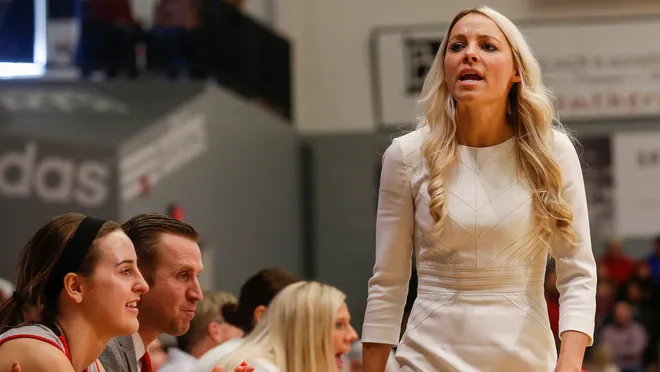When Arizona State University announced Molly Miller as its new women’s basketball coach, her hiring should have been met with the usual analysis: her coaching record, her philosophy on and off the court, and her ability to drive the Sun Devils towards success. Instead, the conversation has taken an all too familiar turn, one that many women in sports experience: a fixation on her physical appearance.
Miller, who made the jump from Grand Canyon University to ASU, has been regarded as one of the rising stars in college basketball coaching. She has an impressive resume—two NCAA Division II national championships, an insane winning percentage, and a reputation for cultivating disciplined teams. Yet, the narrative around her has frequently steered away from her coaching abilities and toward her looks. Some critics on social media claim she’s gaining this attention because she’s “too pretty” and have suggested that the excitement surrounding her hire has more to do with aesthetics than ability.
This is the kind of judgment women in sports face time and again. If they are attractive, their success is often attributed to their looks rather than their hard work. But then if they aren’t considered conventionally attractive, they are lacking marketability. It’s a double standard that dulls the achievements of women at every level of sports.
A tale as old as time, we’ve seen the same situations with athletes like Maria Sharapova to Paige Spiranac, whose credibility has been questioned purely because they fit a certain beauty standard. We’ve even seen it with sports broadcasters like Erin Andrews, who has had to constantly remind audiences that she is more than just a pretty face. Now, here we are again with Molly Miller, who is being reduced to her appearance rather than celebrated for her proven skills and strong leadership.
The most frustrating part though is that no male coach faces this kind of pushback. We don’t question whether a good looking male coach got his job because of his appearance, and we don’t downplay his accomplishments based on it. When conventionally attractive male coaches transition to larger roles or move up in their career, no one is arguing that their big muscles or sharp jawlines helped them land the job
Miller, however, is being forced to defend her legitimacy in ways that male coaches never have to. That’s not just a problem for her, it’s a problem for all women in sports regardless of position. When we judge women in the industry more for their looks than their talent, we reinforce the outdated notion that their worth is tied to appearance rather than skill. It sends a message to young girls who dream of coaching, playing, or working in sports media that they will never truly be taken seriously, no matter how much they achieve.
Molly Miller deserves better and deserves to be taken seriously. Her record speaks for itself, and her talent is undeniable. It’s time we stop treating successful, beautiful women as objects and start recognizing them for what they are: great at what they do.


